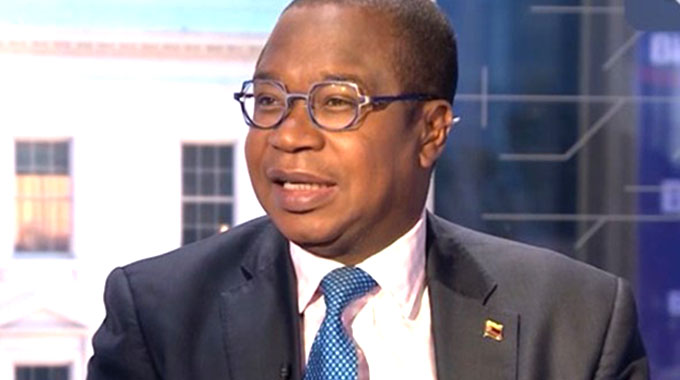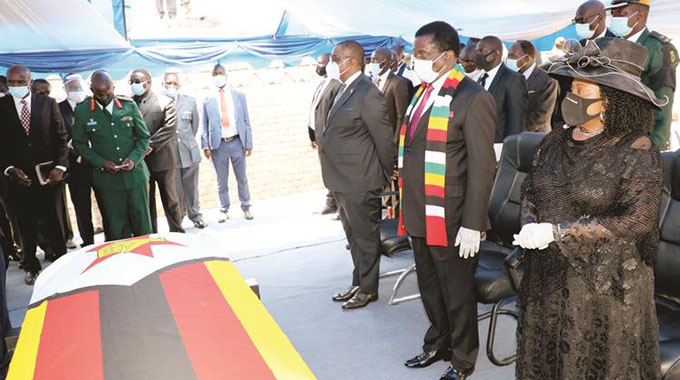Govt, gold firm seal investment deal

Africa Moyo
Deputy News Editor
A major Gwanda goldbelt miner, Caledonia Mining Corporation, signed a memorandum of understanding (MoU) with the Government yesterday so it can boost investment and production in its gold mining and play a leading part in the drive to a US$12 billion mining sector economy by 2023.
President Mnangagwa, speaking at the signing ceremony at State House, said Caledonia’s commitment was testimony that Zimbabwe is a safe investment destination since the coming in of the Second Republic.
He immediately called for the involvement of local communities for the growth of rural industry systems and the achievement of robust provincial gross domestic product, in line with the devolution agenda.
In the MoU, Caledonia declares and affirms its intention to increase gold production in excess of 500 000 ounces, around 15,5 tonnes, by 2030.
Further, the parties acknowledge and agree that where Caledonia has specific interest in identified assets or projects towards the achievement of the target, there shall be need to enter into specific agreements governing those assets.
Said President Mnangagwa: “This ceremony is a milestone achievement towards our quest to attain a US$12 billion mining sector economy by 2023. Furthermore, it is indicative of the Caledonia Mining Corporation’s explicit interest to invest in our economy, affirming that Zimbabwe is a safe investment destination.”
Gold is expected to rake in US$4 billion a year, platinum US$3 billion, diamonds US$1 billion, while chrome, iron, steel and coal will contribute US$1 billion. Lithium is expected to contribute US$500 million while other minerals will contribute US$1,5 billion.
President Mnangagwa said the MoU was vital as it defined the responsibilities of each party, while also providing scope of authority, clarifying terms, conditions and outlining compliance issues regarding the proposed mining interventions.
He implored the Ministry of Mines and Mining Development and Caledonia to speed up the implementation of the agreement, saying bureaucratic and lethargic tendencies were “a thing of the past”.
Government is accelerating measures to improve the cost and ease of doing business, with the recent establishment of the Zimbabwe Investment and Development Agency providing impetus and drive “Zimbabwe is open for Business”.
But President Mnangagwa said as miners carry out their projects, they should be alive to the intricate relationship between the natural environment and development through adoption and use of appropriate mining technologies.
Caledonia has already made considerable capital investments in both underground and surface mining as well as rural infrastructure, in line with the devolution agenda.
The Gwanda-based miner is working on constructing a solar plant which will meet up to 30 percent of its power requirements at its major Blanket Mine.
President Mnangagwa said the solar project was in tandem with Zimbabwe’s thrust for sustainable use of green energy to enhance production and productivity within the broader economic spectrum.
Caledonia is also interested in investing in Government-owned projects, and has pledged to evaluate mining rights and properties.
President Mnangagwa said such expression of interest reflects the private sector’s determination to explore opportunities and partner his administration.
He called on investors in all sectors of the economy to establish partnerships, which propel the national development agenda, “leaving no one behind”.
“Zimbabwe has abundant and diversified mineral endowments, which makes mining a critical sector in the economic development of our great nation. The mining sector continues to immensely contribute to the economic development of the country, contributing more than 60 percent of export receipts and more than 50 percent foreign direct investment into the country,” he said.
The President said he looks forward to successful implementation of the MoU guided by clear and definite timeframes, with Government ready to support expressed mining interests for the ultimate growth of the mining sector and the economy at large.
Vice President Constantino Chiwenga at the same occassion said since President Mnangagwa’s inauguration, he had committed to improving the lives of citizens through creating a conducive investment environment, adding that yesterday’s MoU demonstrated that Zimbabwe was “indeed open for business”.
He called on all stakeholders to work together so that everyone benefits from mines.
Mines and Mining Development Minister Winston Chitando, said the MoU was in line with the projected target of 100 tonnes of gold by 2023.
“I would like to recognise that Caledonia Mining Corporation is approaching the end of its US$70 million investment project which result in Blanket Mine’s annual gold production increasing from the current level of 1,7 tonnes to 2,5 tonnes,” he said.
Chamber of Mines of Zimbabwe CEO, Mr Isaac Kwesu, told The Herald on the sidelines of the event that the MoU magnified all the efforts by Government to unlock value from the mining sector, adding that US$12 billion mining industry target was “something achievable”.
Caledonia CEO Mr Steve Curtis said his company remained committed to investing in Zimbabwe, one of the remaining gold frontiers.
He said they were determined to ensure the health and safety of employees and their families.
Yesterday, Caledonia announced gold produced in the nine months to September 30 was 42 896 ounces (1,33 tonnes), 12 percent more than the 38 306 ounces (1,12 tonned) produced in the same period last year, and the firm remains on track to achieve its production target of 80 000 ounces (almost 2,5 tonnes) by 2022.
Mr Curtis said Blanket Mine had delivered robust production results for the first nine months despite the negative effect of Covid-19 control measures on supply chains and operating arrangements.
State Security Minister Owen Ncube, Finance and Economic Development Minister Professor Mthuli Ncube, Minister of State for Harare Province Oliver Chidau, National Housing and Social Amenities Minister Daniel Garwe, Women’s Affairs, Community and Small and Medium Enterprises Development Dr Sithembiso Nyoni, Chief Secretary to the President and Cabinet Dr Misheck Sibanda, and Deputy Mines Minister Polite Kambamura, were among the dignitaries that attended the signing ceremony.










Comments